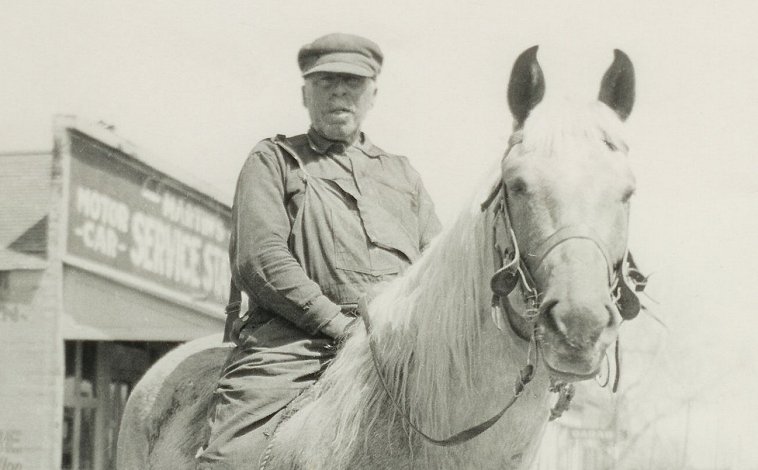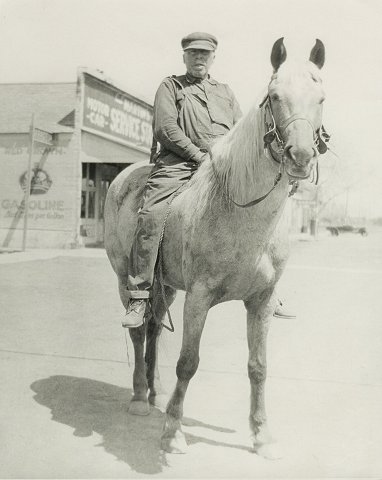
Barber County Kansas

 |
Barber County Kansas |
 |

Bill Horn riding his horse, Silver.
Photo from the
collection of Carol (Lake) Rogers, courtesy of Kim Fowles .
Barber County Index, March 19, 1936. DEATH OF BILL HORN
Bill Horn died Monday, March 15, at the county farm just east of Medicine Lodge, who had he lived until May 12 of this year, would have been 85 years of age, having spent 63 of those years in Barber county. With his death one of the unique and well known characters of early day history in Barber county has passed.
An old time stage driver, Bill Horn knew the county when it was young and could tell many interesting experiences of pioneer days. He carried the mail from Hutchinson to Sun City in 1873, earning the sum of $30 per month. He was in Medicine Lodge at the time of the bank robbery and saw one of the robbers, Brown, killed. He hauled lumber for some of the first business buildings in Medicine Lodge, including the first bank, and for thirty years he was employed by Riley Lake in stage driving and in ranch work. For the past several years he has resided at the county farm.
Bill Horn has been a familiar figure about the streets of Medicine Lodge, and there were few people who did not know him and most of them had a kindly word for the old man who seemed so alone in the world.
Funeral services were conducted from the W. R. Forsyth home on Tuesday afternoon and interment made in Highland Cemetery.
The Medicine Lodge Cresset, August 19, 1898. Bill Horn
On Monday of last week we saw Bill Horn. Bill is working for the Hutchinson & Southern railroad with headquarters at Pretty Prairie. Bill looks just as he did the first time we saw him some 18 or 19 years ago. He does not look a day older, and so far as appearances go, may have been wearing the same clothes he did then.
Bill was a noted character in the early history of Barber county. He carried the mail between Medicine Lodge and Hutchinson 24 and 25 years ago. The day was never too stormy nor the night too dark for Bill to make his regular trip. The stage stations were the only marks of civilization along the almost 100 miles track to Hutchinson, and as passengers were not numerous, Bill usually traveled the road alone.
As the stage was the swiftest means of connection with the outside world, Bill had considerably whiskey to haul, and though the kegs or jugs containing the liquor always lost considerable by evaporation or otherwise while under Bill's charge, it is said to his credit that there was always some left when they arrived at their destination.
Bill did not care for money and would not stoop to pick up gold or silver he saw lying in the road, but he had a wonderful faculty for finding ivory rings, fine whalebone whips and gold and silver plated harness buckles. Bill's team was always decorated most lavishly with ivory rings and fancy buckles, but he would never tell where he found them, doubtless fearing some owner might lay claim to them.
Bill never labored with tenderfeet to acquire a reputation for truth and veracity, but an old friend could always depend on him. One of his proudest claims is that he never wore an overcoat, and when driving stage, on the coldest days of winter, with the mercury below zero and the wind cutting and singing like an Alpine avalanche, he would take off his coat and hide it in the brush along Elm creek, when driving into Medicine Lodge, or the Arkansas river when driving into Hutchinson, and claim to those standing about the P.O. as he drove up, that he had made the trip in his shirt sleeves.
How conditions have changed in a few short years. Along the stage line, when Bill first traveled it, were buffalo and sneaking coyotes and an occasional band of Indians, while today it is lined on each side by farms, and the country is so traversed by railroads that the occupation of stage driving is among the lost arts.
On the old stage road lives the old stage driver, working to keep up communication which he despises in his heart and considers far below the good old stage lines of years agone.
Bill Horn
The Chosen Land: Barber County, Kansas, pg. 238.Bill Horn (probably called William by his mother) was born May 12, 1851, to Susan and Jacob Horn. With his death, March 16, 1936, one of the unique and well known characters of early Barber County history has passed. In 1873 he carried the mail from Hutchinson to Sun City, earning thirty dollars a month. For many years he was employed by Riley Lake who owned the stage coach line from Hutchinson to Medicine Lodge to Alamosa, Colorado. At the time of the Indian scare of 1878, Bill Horn "came galloping up through the trees to warn people in the Amber area - from house to house - telling of the danger, as a modern Paul Revere". He hauled lumber for some of the first business buildings in Medicine Lodge, including the first bank. He was in Medicine Lodge at the time of the bank robbery and saw one of the robbers, Brown, killed.
He could tell many tales of the early days and keep his listeners spellbound. Carrie Nation was a passenger on his stage, coming from Wichita, one evening. As it was getting dusk, he stopped to light the lantern and as he reached for the light, Carrie knocked his cigar out of his mouth. He reached a little farther, picked her up and not gently set her in a snowdrift. He drove on to town, leaving her to travel on as best she could.
The last years Bill lived at the County Farm. His contribution to the family meals was the fish he caught at the old BeeBee pond with his old cane pole and line. The County Farm was east of town, out Currie Lane. Bill walked to town many times to pass time and was a familiar figure on the streets of Medicine Lodge. Everyone knew him and had a kindly word for the old man whose life story would have filled many books.
He is buried in Highland Cemetery - his spirit is on to new frontiers.
By Virginia Woodward Measday.

Bill Horn riding his horse, Silver.
Photo from the
collection of Carol (Lake) Rogers, courtesy of Kim Fowles .
"Bill Horn, old time stage coach driver, died at county farm at the age of 85 years, 63 of which were spent in Barber county."
-- News item from the week of March 19, 1936, "Happenings of 1936 Presented For Index Readers", The Barber County Index, December 31, 1936.
The mysterious disappearance of Eli's whiskey. Liquor tasted so strongly of Elm Creek that Eli began to suspect the driver of the Hutchinson stage - a two- horse buckboard, driven by Bill Horn - of extracting and adulterating. Accordingly word was sent to the drug house at Hutchinson to seal all orders before shipping. Orders' were strictly obeyed, jugs were sealed, Eli gave an exhibition of his old-time levity as he remarked, "By ___, old Bill will come in next time with a hot box." Let us see. Bill arrived smiling (and smelling) complacently as usual. On examination the jugs were found lacking in quantity, although sealed securely with the great seal of Myers Bros'. Eli roared, sent bitter denunciations to the drug house and received answer that jugs contained full measure when shipped; could not account for the shortage; try again. Again and again the jugs were sent back and forth, empty and part full. Eli's only resort was a rectifying process, known only to himself, to make amends for the shortage.
Let us digress a moment from the main scene.
Enter Bolliver, just from the range - Got any good whiskey, Eli?"
Eli: "You bet I have, four years old, vintage of '70."
Eli pours out a glass full which Bolliver greedily grasps and fills his mouth and as' quickly spits it out on the floor with an hurried oath. As soon as he could regain his breath he gasped: "Eli, give me some you made last night; that stuff's too d____d old."
One day as Eli was getting the empty jugs ready for be refilled he accidentally dropped one and it was broken to pieces, and with the breaking dawned a light on the mystery, for in the bottom of the jug there were twenty-one small holes drilled with a nail and so nicely plugged with pine plugs as to defy detection. The jugs were never again sealed and to Bill's credit be it said he never took any more whiskey from the jugs than he wanted.
-- Musings of the Pilgrim Bard: A Book of Poems by Scott Cummins, page 250 -251.
Naming of the Carry A. Nation Bridge Near Medicine Lodge "Voting started on naming big new bridge over Medicine River on U. S. 160. Names first mentioned were Bill Horn bridge, Alexander bridge, Henry M. Stanley bridge, Ayyadl-dya bridge, I-See-O bridge, Carry A. Nation bridge." -- The Barber County Index, July 4, 1935.
"Voting begins on choosing bridge name, beginning heated contest between names Bill Horn and Carry A. Nation." -- The Barber County Index, August 15, 1935.
"More than 800 votes had been cast for a name for new bridge." -- The Barber County Index, September 5, 1935.
"New bridge is named for Carry A. Nation after more than 3000 votes are cast." -- The Barber County Index, September 19, 1935.
For information on other stage coach drivers and stage line operators, see:
Riley Lake "In the early days of Barber county he engaged in the freighting and stage coach business, operating a line from Wellington to Medicine Lodge and up the Medicine River and on to Coldwater and Dodge City."
Charles B. "Keno" Armstrong, Barber County stagecoach driver.
Donald R. "Cannonball" Green Founder of the Cannonball Stagecoach Line; father of Greensburg, Kansas.
Pat Gallagher He had a stage line between Coldwater and Sun City.
Sectional Map of Comanche County, Kansas This map shows routes of the stagecoach lines in Comanche County, note the Lake Stagecoach route.
"The first roads were simply mowed swaths from one location to another. In one instance a prairie fire burned off the grass and it was hard to find the road toward Kinsley. This road quickly became a "main-traveled" road. Some freighting was also done from Medicine Lodge. Stagecoach lines started and did a thriving business. One of the first was the Coldwater-Kinsley line, owned by Doak and Clinton. Soon Col. D.R. Green had his famous "Cannonball" stage line in operation between Kingman and Coldwater, giving daily service. The Coldwater - Nescatunga - Sun City - Medicine Lodge line started with Riley Lake as principal owner and R.A. Callaway as driver most of the time. Pat Gallagher also had a line between Coldwater and Sun City. Later the "Western Stage Line" started between Coldwater and Ashland, stopping at Protection and Red Bluff. The following year, a stage line ran out of Coldwater to Avilla and Comanche City." -- Excerpt from Coldwater Centennial Notebook, by Evelyn Reed.
Thanks to Ellen (Knowles) Bisson for finding, transcribing and contributing the above article from KSHS Microfilm Reel #M870 to this web site! (The original article was printed as one large paragraph.) Thanks to Shirley Brier for finding and contributing the obituary.